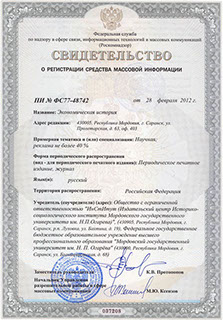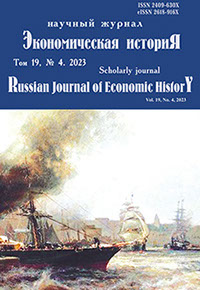Экономическая историЯ
Russian Journal of Economic History
ISSN 2409-630X (Print)
ISSN 2618-916X (Online)
Expert board:
- Scientific Council of RAS on economic history;
- Research and Educational Center «The economic history of Central Russia and the Middle Volga region» of Ogarev Mordovia State University;
- Center of Economic History of Lomonosov Moscow State University
Navigation
Certificate of registration

ISSN 2409-630X (Print), ISSN 2618-916X (Online)
DOI: 10.15507/2409-630X.063.019.202304.364-375
Anton O. Gorbachev1, Ol’ga M. Semerikova2
Ural Federal University (Ekaterinburg, Russia)
1 e-mail: gorbachyov.anton@mail.ru
2 e-mail: olgasemerikova8@yandex.ru
Practices of Formation of Managerial Personnel in Collective Farms of the Middle Urals in 1965–1982: on the Issue of Preserving Collective Farm Democracy
Abstract
Introduction. In the article, on the basis of archival materials on the example of the Middle Urals, the issue of the practices of the formation of managerial personnel in collective farms is considered. The authors of the study question the widespread thesis that collective farms more and more resembled state farms – that is, managers were mainly appointed by higher authorities, and ordinary collective farmers could not influence this in any way.
Results. We have identified at least three mechanisms for the formation of collective farm chairmen. The first mechanism assumed that the candidate for the position of head was an independent figure from the district committee, and was elected by the collective farmers at the meeting. In another case, the candidate was approved by the district committee or the city committee of the party and at the collective farm meeting only the candidate was approved for office. It is worth noting that such a statement was not always passed unanimously, and sometimes with the most severe resistance on the part of ordinary members of the collective farm. The third option of election is a compromise: if the collective farmers needed to leave one or another chairman of the collective farm, the district or city authorities could not offer their candidate, but agree with the opinion of the collective farmers.
Discussion and Conclusion. Thus, the authors came to the conclusion that elements of democracy in the collective farms of the Middle Urals still existed in the above-mentioned period.
Keywords: chairman of the collective farm, minutes of party meetings, Middle Urals.
For citation: Gorbachev A. O., Semerikova O. M.. Practices of Formation of Managerial Personnel in Collective Farms of the Middle Urals in 1965–1982: on the Issue of Preserving Collective Farm Democracy. Ekonomicheskaya istoriya = Russian Journal of Economic History. 2023; 19(4): 364–375. (In Russ.). DOI: 10.15507/2409-630X.063.019.202304.364-375.
© Ogarev Mordovia State University. History and Sociology Institute, 2017
68, Of. 411, Bolshevistskaya St., 430005, The editorial office of the scholarly journal «Russian Journal of Economic History»
Tel.: (8342) 24-25-90; 27-07-11, Fax: (8342) 24-25-90, E-mail: jurnal-econom-hist@isi.mrsu.ru
Designed by A. Napalkov, Email: napalkov@isi.mrsu.ru

